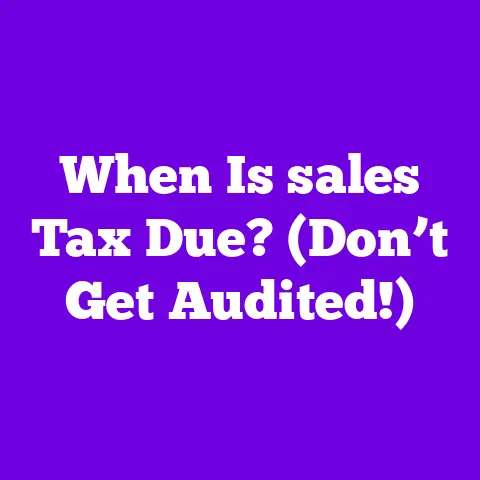When Does Short sale drop? (Credit Score SOS!)
In an era where financial innovation is reshaping the landscape of real estate and credit scoring, understanding the nuances of transactions like short sales becomes increasingly vital.
The financial sector has evolved dramatically, with new products and services emerging that provide homeowners with alternatives to traditional methods of selling their properties.
One such alternative is the short sale, a process that allows homeowners facing financial difficulties to sell their homes for less than the amount owed on their mortgage with the lender’s approval.
This can provide a lifeline for those unable to keep up with their mortgage payments, but it comes with its own set of complexities.
A short sale can be a double-edged sword: it offers a way out of a financial bind but can also lead to significant repercussions for the homeowner’s credit score.
This article aims to explore the intricate relationship between short sales and credit scores, specifically focusing on the timing of when a credit score drops as a result of a short sale.
Understanding this timing is crucial for homeowners and potential buyers alike, as it can influence future financial decisions, including the ability to secure new loans and interest rates.
Section 1: The Mechanics of Short Sales
To fully grasp the impact of short sales, it’s essential to define what a short sale entails and how it differs from other forms of real estate transactions, such as foreclosures.
In a short sale, the homeowner sells their property for less than the remaining balance on their mortgage, with the lender agreeing to accept the lesser amount.
This is often pursued when the homeowner cannot afford their mortgage payments and wishes to avoid the lengthy and damaging process of foreclosure.
Initiating a short sale involves multiple parties: the homeowner, the lender, and potential buyers.
The process begins when the homeowner contacts their lender to discuss their financial difficulties and express interest in pursuing a short sale.
The lender will typically require documentation to evaluate the homeowner’s financial situation.
Once approved, the homeowner can list the property, and interested buyers can make offers.
The lender must then approve the final sale price, which may take time and negotiation.
Financial implications for the homeowner can vary.
One significant benefit of a short sale is the potential for debt forgiveness, meaning the lender may agree to forgive the remaining mortgage balance after the sale.
However, this is not guaranteed, and homeowners must also consider potential tax consequences.
For instance, forgiven debt may be considered taxable income unless specific conditions are met under the Mortgage Forgiveness Debt Relief Act.
Statistics reveal that short sales have become more prevalent during economic downturns.
For example, during the 2008 financial crisis, short sales represented a significant portion of distressed home sales.
In certain regions, short sales accounted for over 20% of all real estate transactions, highlighting their role as a common solution for homeowners in distress.
Section 2: The Impact of Short Sales on Credit Scores
Understanding how credit scores are calculated is vital when assessing the impact of short sales.
Credit scores are primarily determined by five key factors: payment history, amounts owed, length of credit history, new credit, and types of credit used.
Among these, payment history carries the most weight, making it a crucial area of concern for homeowners considering a short sale.
When a homeowner undergoes a short sale, the impact on their credit score can be significant but typically less damaging than a foreclosure.
On average, a short sale may result in a credit score drop of 200 to 300 points, depending on the individual’s credit profile.
In contrast, a foreclosure can lead to a drop of 300 to 400 points.
This difference may seem minor, but it can have long-lasting effects on an individual’s financial opportunities.
Expert opinions from credit bureaus suggest that the timing and manner in which a short sale is reported to credit agencies can influence the severity of the score drop.
If a homeowner has been behind on payments before initiating the short sale, their score may already be adversely affected, leading to a more substantial decline upon completion of the sale.
Conversely, if they have maintained a good payment history up until the short sale, the impact may be less severe.
The duration of the credit score drop following a short sale varies by individual but typically lasts for several years.
While the immediate effects can be significant, many homeowners can begin to recover their credit scores within two to three years post-sale, especially if they adopt proactive measures to rebuild their credit.
Section 3: Timing the Drop: When Does the Short Sale Drop Occur?
Timing is a critical aspect of understanding how and when a credit score drops in relation to a short sale.
The credit score drop can occur at different points throughout the short sale process.
For many homeowners, the drop may first manifest at the initiation of the short sale, particularly if they have missed mortgage payments or defaulted on their loan prior to the sale.
However, the most significant drop often occurs once the short sale closes.
At this point, the lender officially reports the sale as a settled debt to the credit bureaus, reflecting the loss incurred by the sale.
The timing of this reporting can vary based on lender policies and state laws, which may influence when the sale is reported and how it is classified on the homeowner’s credit report.
In different markets and economic conditions, trends may emerge that affect the timing of these drops.
For instance, in a robust housing market, the short sale process may be expedited, leading to a faster reporting time.
Conversely, in a declining market where properties linger unsold, the process may be prolonged, delaying the credit score drop.
Personal anecdotes from individuals who have navigated short sales can shed light on this timing.
One homeowner, Sarah, shared her experience of initiating a short sale after losing her job.
She found that her credit score dropped significantly during negotiations with her lender, even while she was still current on her payments.
However, the most substantial decline occurred after the sale was finalized, when her lender reported the transaction to the credit bureaus.
Her journey highlights the emotional and financial toll of this process, underscoring the importance of timing in understanding credit score impacts.
Section 4: Post-Short Sale: Recovery and Rebuilding Credit
Once the dust settles from a short sale, the recovery process becomes paramount.
Homeowners often wonder how long it will take for their credit scores to rebound after the stress of a short sale.
While the timeline can vary significantly based on individual circumstances, many people can start seeing improvements within a couple of years if they actively work on rebuilding their credit.
Rebuilding credit after a short sale involves several strategies and best practices.
First and foremost, it’s crucial to stay current on all other debts, including credit cards, auto loans, and any new mortgage payments.
Consistent, on-time payments will help signal to credit bureaus that the individual is responsible and financially stable.
Monitoring credit reports is also essential.
Homeowners should obtain copies of their credit reports to ensure that all information reported is accurate.
Any discrepancies or errors should be disputed promptly, as inaccuracies can further damage an already fragile credit score.
Another critical aspect of credit rebuilding is managing credit utilization.
Keeping credit card balances low relative to credit limits can positively influence credit scores.
Financial advisors often recommend using less than 30% of available credit and paying off balances in full each month to demonstrate responsible credit behavior.
Insights from credit counselors can provide additional recovery tactics.
They often emphasize the importance of establishing new lines of credit, such as secured credit cards, which can help rebuild credit history.
Over time, as new positive payment behaviors are established, individuals may find their scores gradually improving.
Section 5: Long-Term Effects and Future Trends
The long-term implications of short sales on individuals’ financial health and creditworthiness are multifaceted.
While the immediate impact on credit scores can be severe, many individuals find ways to recover and rebuild their credit over time.
However, the stigma associated with short sales can linger, potentially affecting future lending opportunities and interest rates.
Emerging trends in the real estate market can also influence the frequency and perception of short sales.
As financial innovation continues to reshape the lending landscape, alternative options for distressed homeowners, such as loan modifications and forbearance programs, are becoming more prevalent.
These alternatives may lessen the reliance on short sales, offering homeowners more favorable routes to retain their homes while managing their debts.
Moreover, advancements in credit scoring models could alter the impact of short sales on credit.
As lenders increasingly adopt more nuanced scoring systems that consider a borrower’s overall financial behavior rather than just negative events, individuals who have experienced short sales may find it easier to achieve favorable credit scores in the future.
In conclusion, as the financial sector continues to evolve, understanding the dynamics of short sales and their impacts on credit scores is crucial for homeowners navigating challenging situations.
Awareness of the timing of credit score drops, the recovery process, and the long-term implications can empower individuals to make informed financial decisions.
Conclusion
In summary, the timing of credit score drops associated with short sales is a significant aspect of the overall impact on homeowners.
Understanding when these drops occur, whether at the initiation of the sale or upon closure, can help individuals better prepare for their financial futures.
As real estate and financial landscapes continue to evolve, staying informed and proactive becomes increasingly essential.
Homeowners, lenders, and the broader real estate market must adapt to the changing tides of financial innovation.
By recognizing the consequences of short sales and embracing new opportunities for recovery, individuals can navigate the complexities of their financial journeys with greater confidence.
The future of short sales and credit scores remains uncertain, but with knowledge comes power, and staying informed can provide a path forward in challenging times.






